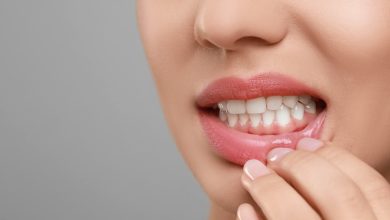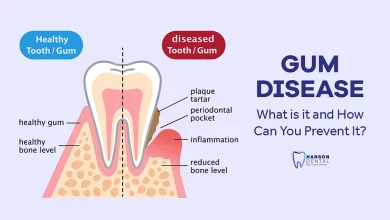Why Do My Gums Hurt After Dental Cleaning? You Must Know!

After a dental cleaning, your gums may hurt due to the removal of plaque and tartar, causing temporary inflammation. A dental cleaning is essential for maintaining good oral health.
However, it’s not uncommon to feel some discomfort afterward, particularly in your gums. The main reason your gums may hurt after a dental cleaning is the removal of plaque and tartar. While the cleaning process can cause slight irritation, it is temporary and a sign that your dentist effectively removed built-up bacteria and deposits from your teeth and gums.
This irritation usually subsides within a few days as your gums heal and adjust to the newfound cleanliness. It’s important to continue practicing good oral hygiene and follow any post-cleaning recommendations from your dentist to alleviate discomfort and maintain optimal gum health.
The Importance Of Dental Cleanings
Regular dental cleanings are essential to maintain good oral health and prevent gum disease. These cleanings not only help remove plaque and tartar buildup but also provide several benefits:
| Prevents Gum Disease: | Dental cleanings help prevent gum disease by removing bacteria and plaque from the gumline. This reduces the risk of inflammation and infection. |
| Early Detection and Treatment: | During a cleaning, a dental professional can spot early signs of dental problems such as cavities, gum disease, or oral cancer. Timely detection leads to prompt treatment and prevents further complications. |
| Improves Overall Oral Health: | Cleanings ensure the removal of surface stains, keeping your teeth looking whiter and brighter. Additionally, they contribute to maintaining fresh breath by reducing bacteria in the mouth. |
| Enhances Overall Health: | Poor oral health can lead to various systemic conditions such as heart disease, diabetes, and respiratory infections. Regular cleanings help minimize the risk of these health issues. |
By scheduling regular dental cleanings, you can preserve your oral health, prevent gum disease, and maintain an overall healthy body.
What Happens During A Dental Cleaning
During a dental cleaning, a dental hygienist plays a crucial role in ensuring thorough oral hygiene. They use various tools and techniques to clean your teeth effectively. These tools often include a scaler to remove plaque and tartar buildup, which can contribute to gum irritation.
Dental hygienist’s role in the cleaning process:
- Examining your teeth and gums to identify any potential issues
- Using a scaler to gently remove plaque and tartar from the surfaces of your teeth
- Performing a thorough flossing to clean between the teeth and along the gumline
- Polishing your teeth using a special toothpaste and a rotating brush
- Providing fluoride treatment to strengthen your tooth enamel and protect against cavities
Tools and techniques used during a cleaning:
| Tools | Techniques |
|---|---|
| Scaler | Removing plaque and tartar buildup |
| Floss | Cleaning between teeth and along the gumline |
| Rotating brush | Polishing teeth |
| Fluoride treatment | Strengthening tooth enamel |
These professional cleanings are essential to maintain good oral health and prevent gum diseases. However, it’s normal to experience some gum soreness or tenderness after the cleaning, which usually subsides within a few days.
Common Causes Of Gum Discomfort After Dental Cleaning
|
Common Causes of Gum Discomfort After Dental Cleaning |
|
Excessive plaque and tartar buildup: During a dental cleaning, your dentist or dental hygienist removes plaque and tartar from your teeth and gum line. However, if you have excessive buildup, it can cause sensitivity and discomfort in your gums. Aggressive cleaning techniques: While a thorough cleaning is important, using too much force or aggressive scraping during the cleaning process can lead to gum pain and irritation. Be sure to communicate any discomfort to your dentist or hygienist. Presence of underlying gum disease: If you already have gum disease, such as gingivitis or periodontitis, the deep cleaning involved in a dental cleaning can exacerbate any existing discomfort or inflammation. |

Credit: www.jacksonavedental.com
Understanding Gum Sensitivity
After a dental cleaning, it is common for gums to feel sensitive or even painful. Several factors contribute to this gum sensitivity:
| 1. Plaque and tartar removal: | During a dental cleaning, your hygienist removes the accumulated plaque and tartar from your teeth and gum line. This process can temporarily expose the sensitive nerve endings in your gums, causing discomfort. |
| 2. Gum inflammation: | If you have gum disease or gingivitis, your gums may already be inflamed. During the cleaning, the manipulation of your gums can exacerbate the sensitivity and cause discomfort. |
| 3. Teeth polishing: | Polishing your teeth after cleaning can also contribute to gum sensitivity. The abrasive nature of the polishing agent can irritate the gums temporarily. |
It is important to note that gum sensitivity after a dental cleaning is usually temporary and should subside within a few days. If the pain or sensitivity persists or worsens, it is advisable to contact your dentist for further evaluation.
Post Cleaning Aftercare Tips
After a dental cleaning, it is common for gums to feel tender or sore. This discomfort is usually temporary and can be managed with a few post-cleaning aftercare tips. First and foremost, it is essential to practice appropriate brushing and flossing techniques.
Using a soft-bristled toothbrush with gentle toothpaste can help prevent further irritation to sensitive gums. Make sure to brush gently in circular motions, focusing on each tooth and the gumline. Additionally, incorporating mouthwash into your oral hygiene routine can provide an extra measure of care.
Rinsing with an antimicrobial mouthwash can help kill bacteria and reduce inflammation. Choose a mouthwash that is specifically designed to support gum health. Remember to swish the mouthwash around for the recommended time before spitting it out. Following these aftercare tips can help alleviate gum discomfort and promote optimal healing after a dental cleaning.
When To Seek Professional Help
After a dental cleaning, it is not uncommon to experience gum discomfort. However, it is important to distinguish between normal and abnormal gum pain. If you are experiencing excessive or prolonged pain, it is advisable to seek professional help. This could indicate an underlying issue such as infection or gum disease.
Some signs to look out for include persistent tenderness, swelling, or bleeding of the gums. These symptoms could be indicative of an infection or gum disease.
It is crucial to schedule follow-up visits with your dentist after a cleaning. These visits allow your dentist to monitor your oral health and address any concerns. Regular check-ups ensure that any potential issues are detected and treated early, preventing further complications.
Preventing Gum Discomfort In Future Cleanings
Regular dental cleanings are important for maintaining good oral health and preventing gum discomfort. During a dental cleaning, the dental hygienist removes plaque and tartar buildup from your teeth and gums. While this process helps to keep your smile healthy and prevent gum disease, some people may experience gum sensitivity or discomfort afterwards.
One effective way to prevent gum discomfort during future cleanings is by practicing good oral hygiene at home. Brush your teeth at least twice a day for two minutes each time, using a soft-bristled toothbrush and fluoride toothpaste. Floss daily to remove plaque and food particles from between your teeth and along the gumline.
It’s also important to communicate with your dental hygienist about any gum sensitivity you may have. They can provide recommendations and adjust the cleaning technique to minimize discomfort. Additionally, they may suggest using a desensitizing toothpaste or mouthwash before and after your cleaning.
By following these tips and maintaining good oral hygiene practices, you can help prevent gum discomfort during future dental cleanings and keep your smile healthy and pain-free.
Frequently Asked Questions On Why Do My Gums Hurt After Dental Cleaning?
How Long Should Gums Hurt After Cleaning?
Gums may hurt after cleaning for a day or two. The discomfort is usually mild and temporary.
How Long Do Teeth Hurt After Dental Cleaning?
Teeth may be sensitive for a day or two after a dental cleaning, but the discomfort should go away on its own.
How Can I Soothe My Gums After Dentist?
To soothe your gums after a dentist visit, gently rinse your mouth with saltwater or a saltwater solution. Apply a cold compress to your cheek to reduce swelling. Avoid hot and spicy foods, and opt for soft, cool foods instead.
Take over-the-counter pain relievers if needed and maintain good oral hygiene to aid in healing.
Why Are My Gums Inflamed After Cleaning?
Inflamed gums after cleaning could be caused by the removal of plaque and tartar, which can irritate the gums. It’s also possible that you may have a pre-existing gum disease or sensitivity to the cleaning procedure. Consult with your dentist to determine the exact cause and appropriate treatment.
Conclusion
After a dental cleaning, it’s not uncommon for gums to feel tender. This discomfort may be due to the removal of plaque and tartar, which can cause temporary inflammation. Maintaining good oral hygiene practices and following any post-cleaning instructions provided by your dentist can help alleviate the pain.
Remember to schedule regular dental cleanings to keep your gums healthy and prevent any further oral health issues. Taking care of your gums is essential for a beautiful and pain-free smile.





